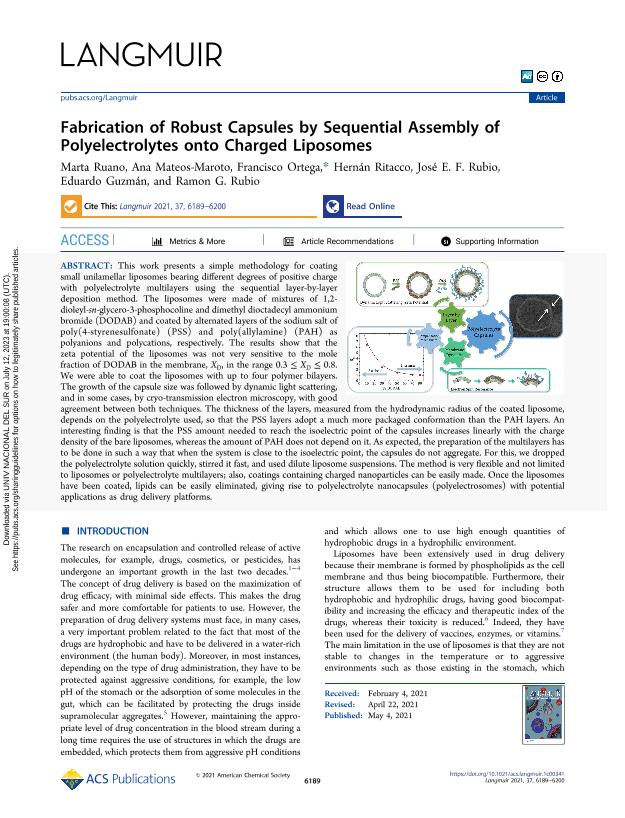Mostrar el registro sencillo del ítem
dc.contributor.author
Ruano, Marta
dc.contributor.author
Mateos Maroto, Ana
dc.contributor.author
Ortega, Francisco
dc.contributor.author
Ritacco, Hernán Alejandro

dc.contributor.author
Fernández Rubio, José Emilio
dc.contributor.author
Guzmán, Eduardo
dc.contributor.author
Rubio, Ramón G.

dc.date.available
2023-07-20T12:17:19Z
dc.date.issued
2021-05-04
dc.identifier.citation
Ruano, Marta; Mateos Maroto, Ana; Ortega, Francisco; Ritacco, Hernán Alejandro; Fernández Rubio, José Emilio; et al.; Fabrication of Robust Capsules by Sequential Assembly of Polyelectrolytes onto Charged Liposomes; American Chemical Society; Langmuir; 37; 20; 4-5-2021; 6189-6200
dc.identifier.issn
0743-7463
dc.identifier.uri
http://hdl.handle.net/11336/204575
dc.description.abstract
This work presents a simple methodology for coating small unilamellar liposomes bearing different degrees of positive charge with polyelectrolyte multilayers using the sequential layer-by-layer deposition method. The liposomes were made of mixtures of 1,2-dioleyl-sn-glycero-3-phosphocoline and dimethyl dioctadecyl ammonium bromide (DODAB) and coated by alternated layers of the sodium salt of poly(4-styrenesulfonate) (PSS) and poly(allylamine) (PAH) as polyanions and polycations, respectively. The results show that the zeta potential of the liposomes was not very sensitive to the mole fraction of DODAB in the membrane, XD, in the range 0.3 ≤ XD ≤ 0.8. We were able to coat the liposomes with up to four polymer bilayers. The growth of the capsule size was followed by dynamic light scattering, and in some cases, by cryo-transmission electron microscopy, with good agreement between both techniques. The thickness of the layers, measured from the hydrodynamic radius of the coated liposome, depends on the polyelectrolyte used, so that the PSS layers adopt a much more packaged conformation than the PAH layers. An interesting finding is that the PSS amount needed to reach the isoelectric point of the capsules increases linearly with the charge density of the bare liposomes, whereas the amount of PAH does not depend on it. As expected, the preparation of the multilayers has to be done in such a way that when the system is close to the isoelectric point, the capsules do not aggregate. For this, we dropped the polyelectrolyte solution quickly, stirred it fast, and used dilute liposome suspensions. The method is very flexible and not limited to liposomes or polyelectrolyte multilayers; also, coatings containing charged nanoparticles can be easily made. Once the liposomes have been coated, lipids can be easily eliminated, giving rise to polyelectrolyte nanocapsules (polyelectrosomes) with potential applications as drug delivery platforms.
dc.format
application/pdf
dc.language.iso
eng
dc.publisher
American Chemical Society

dc.rights
info:eu-repo/semantics/openAccess
dc.rights.uri
https://creativecommons.org/licenses/by/2.5/ar/
dc.subject
LIPOSOMES
dc.subject
LAYER BY LAYER
dc.subject
CAPSULES
dc.subject
NANOTECHNOLOGY
dc.subject.classification
Otras Ciencias Físicas

dc.subject.classification
Ciencias Físicas

dc.subject.classification
CIENCIAS NATURALES Y EXACTAS

dc.title
Fabrication of Robust Capsules by Sequential Assembly of Polyelectrolytes onto Charged Liposomes
dc.type
info:eu-repo/semantics/article
dc.type
info:ar-repo/semantics/artículo
dc.type
info:eu-repo/semantics/publishedVersion
dc.date.updated
2021-12-03T19:30:54Z
dc.journal.volume
37
dc.journal.number
20
dc.journal.pagination
6189-6200
dc.journal.pais
Estados Unidos

dc.description.fil
Fil: Ruano, Marta. Universidad Complutense de Madrid. Facultad de Ciencias Químicas; España
dc.description.fil
Fil: Mateos Maroto, Ana. Universidad Complutense de Madrid. Facultad de Ciencias Químicas; España
dc.description.fil
Fil: Ortega, Francisco. Universidad Complutense de Madrid. Facultad de Ciencias Químicas; España
dc.description.fil
Fil: Ritacco, Hernán Alejandro. Consejo Nacional de Investigaciones Científicas y Técnicas. Centro Científico Tecnológico Conicet - Bahía Blanca. Instituto de Física del Sur. Universidad Nacional del Sur. Departamento de Física. Instituto de Física del Sur; Argentina
dc.description.fil
Fil: Fernández Rubio, José Emilio. Universidad Complutense de Madrid; España
dc.description.fil
Fil: Guzmán, Eduardo. Universidad Complutense de Madrid. Facultad de Ciencias Químicas; España
dc.description.fil
Fil: Rubio, Ramón G.. Universidad Complutense de Madrid. Facultad de Ciencias Químicas; España
dc.journal.title
Langmuir

dc.relation.alternativeid
info:eu-repo/semantics/altIdentifier/doi/https://doi.org/10.1021/acs.langmuir.1c00341
dc.relation.alternativeid
info:eu-repo/semantics/altIdentifier/url/https://pubs.acs.org/doi/pdf/10.1021/acs.langmuir.1c00341
Archivos asociados
